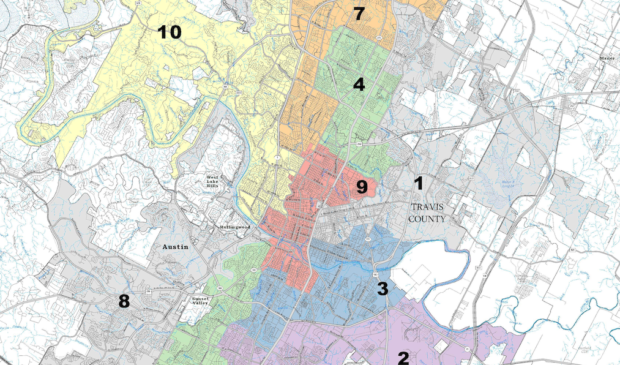Judge hears arguments on Council election lawsuit
Friday, May 13, 2022 by
Jo Clifton After a hearing Thursday, Travis County District Judge Lora Livingston told attorneys for the city and for plaintiffs seeking to force the city to hold City Council elections in all districts this fall that she would make a decision on the case by early next week. Attorney Bill Aleshire is representing the plaintiffs. Assistant city attorneys Brandon Mickle and Sara Rice argued on the city’s behalf.
The case hinges on whether, under the Texas Constitution, a voter who is moved from one district to another under redistricting must be allowed to vote for a Council member in the new district in the next election even when that seat is not scheduled for an election.
Elections are staggered under the city charter. Council districts 2, 4, 6, 7 and 10 elected Council members to four-year terms in 2020. Those seats are not scheduled to be on the ballot until November 2024. The mayor and representatives for districts 1, 3,5, 8 and 9 will be on the ballot this November.
Thirteen plaintiffs sued the city, claiming they will be unlawfully denied the right to vote in a Council election this fall because they were moved from a district scheduled to vote into a district that will not elect a new Council member until 2024. Six other Austinites have filed a designation of campaign treasurer for districts that are not scheduled to hold elections this fall, indicating they wish to run for those seats. Their affidavits were attached to the lawsuit as evidence.
According to the lawsuit, 34,651 voters were moved during redistricting from one district to another. The lawsuit says “almost 23,000 Austin voters have now been disenfranchised for the next two years.”
Although some voters were moved into new districts that are not voting this year, others who voted just two years ago were moved into districts that are voting this year.
As Aleshire wrote in the lawsuit, “Denying 22,762 voters their fundamental right to vote on Council representation for six years while giving 5,025 advantaged voters the chance to vote on two Council seats in just two years is not something insignificant that our courts can justifiably dismiss as an inevitable consequence of redistricting where there are staggered terms of office.”
While Aleshire argued that his clients and other voters were moved into districts where they cannot vote for two more years, Mickle said that the plaintiffs were relying on a “nonexistent right to vote more frequently.” Other courts have rejected a claim that temporarily deferring a vote violates the constitutional right to vote, he said.
Mickle told the court that the people who were writing the ballot language for the vote on single-member districts in 2012 certainly understood the effects of redistricting and staggered terms. They simply did not want to address that question in the ballot language. He said if there is to be a change in how the city conducts its elections or Council members’ terms it should be done by allowing voters to vote on it.
Judge Livingston asked numerous questions during the hearing. She asked how to weigh the rights of voters who elected their Council members to four-year terms just two years ago against the rights of voters Aleshire claims are disenfranchised by redistricting. He said the current Council members certainly can run and win their offices again in November.
In addition to filing the lawsuit in district court, Aleshire also filed a petition for mandamus with the 3rd Court of Appeals and the Texas Supreme Court. The court of appeals rejected his petition, which will speed up the process at the Supreme Court.
Livingston asked the lawyers whether she should rule on the questions before her or wait and let the higher court decide without her input. The city’s legal team strongly urged her to rule on the issues. She could decide to rule that the plaintiffs do not have standing to sue rather than wade into the questions about whether Austin’s redistricting format violates the constitution. Either way, the Texas Supreme Court will make the final decision.
The Austin Monitor’s work is made possible by donations from the community. Though our reporting covers donors from time to time, we are careful to keep business and editorial efforts separate while maintaining transparency. A complete list of donors is available here, and our code of ethics is explained here.
You're a community leader
And we’re honored you look to us for serious, in-depth news. You know a strong community needs local and dedicated watchdog reporting. We’re here for you and that won’t change. Now will you take the powerful next step and support our nonprofit news organization?




